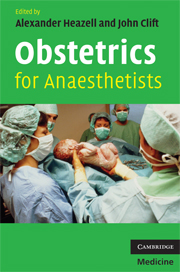Book contents
- Frontmatter
- Contents
- List of contributors
- Foreword
- Preface
- Acknowledgements
- List of abbreviations
- 1 Maternal physiology and obstetrics
- 2 Antenatal care
- 3 Induction of labour
- 4 Normal labour
- 5 Abnormal labour
- 6 Fetal monitoring
- 7 Pre-eclampsia and hypertensive disorders of pregnancy
- 8 Operative obstetrics
- 9 Obstetric haemorrhage
- 10 Thromboembolic disorders of pregnancy
- 11 Infection
- 12 Life support in obstetrics
- 13 Drugs in obstetrics
- 14 Confidential enquiries into fetal, neonatal and maternal death
- Appendix 1 Adult Advanced Life Support Algorithm
- Appendix 2 The Management of Postpartum Haemorrhage Algorithm
- Appendix 3 Emergency Management of Eclamptic Fit Algorithm
- Index
- References
12 - Life support in obstetrics
Published online by Cambridge University Press: 21 August 2009
- Frontmatter
- Contents
- List of contributors
- Foreword
- Preface
- Acknowledgements
- List of abbreviations
- 1 Maternal physiology and obstetrics
- 2 Antenatal care
- 3 Induction of labour
- 4 Normal labour
- 5 Abnormal labour
- 6 Fetal monitoring
- 7 Pre-eclampsia and hypertensive disorders of pregnancy
- 8 Operative obstetrics
- 9 Obstetric haemorrhage
- 10 Thromboembolic disorders of pregnancy
- 11 Infection
- 12 Life support in obstetrics
- 13 Drugs in obstetrics
- 14 Confidential enquiries into fetal, neonatal and maternal death
- Appendix 1 Adult Advanced Life Support Algorithm
- Appendix 2 The Management of Postpartum Haemorrhage Algorithm
- Appendix 3 Emergency Management of Eclamptic Fit Algorithm
- Index
- References
Summary
Keywords
- Type
- Chapter
- Information
- Obstetrics for Anaesthetists , pp. 136 - 139Publisher: Cambridge University PressPrint publication year: 2008



